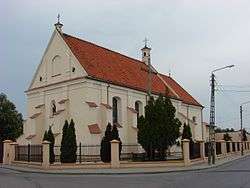Piątek, Łódź Voivodeship
Piątek [ˈpjɔntɛk] is a town in Łęczyca County, Łódź Voivodeship, in central Poland. It is the seat of the gmina (administrative district) called Gmina Piątek. It lies approximately 20 kilometres (12 mi) east of Łęczyca and 32 km (20 mi) north of the regional capital Łódź.
Piątek | |
|---|---|
Town | |
 Parish church of The Holy Trinity, 15th century. | |
 Piątek | |
| Coordinates: 52°4′9″N 19°28′50″E | |
| Country | |
| Voivodeship | Łódź |
| County | Łęczyca |
| Gmina | Piątek |
| Population | 2,130 |
The town has a population of 2,130. It is claimed to lie at the "geometrical centre" of Poland, although it is not the true geographical centre – it is the centre determined as the intersection of the great circle diagonals of a rectangle formed by lines of latitude and longitude passing through the four extreme points of Poland.
World War II history
During the German Invasion of Poland in 1939, Wehrmacht soldiers on 13 September took 50 males (43 Poles and 7 Jews) out of homes and ordered them to repair a damaged bridge. After the work was completed the German soldiers shot all of them. Another massacre took place later in which 50 Jews were executed.[1]
Before the war around 1300 Jews lived in Piątek. After the German occupation in September, a few hundred fled. In late 1940, the remaining 840 Jews were confined to a ghetto and stripped of their possessions. Many Jews in the Piątek ghetto died of starvation and disease due to limited food and severe overcrowding. In 1941, hundreds were taken to labor camps. In 1942, German police began randomly shooting Jews and in August 1942 rounded them up and shot those who were ill and elderly in the local cemetery. Others were sent to the Lodz ghetto. Most were sent to the Chelmno extermination camp where they were immediately gassed. Only a few of Piątek's Jews survived the war.[2]
Points of interest

References
- Szymon Datner, "55 dni Wehrmachtu w Polsce", pp. 373-375. Warszawa, Wydawn. Ministerstwa Obrony Narodowej, 1967. OCLC 12624404
- Megargee, Geoffrey (2012). Encyclopedia of Camps and Ghettos. Bloomington, Indiana: University of Indiana Press. p. Volume II, 92-93. ISBN 978-0-253-35599-7.
